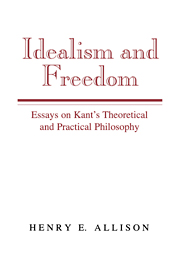Book contents
- Frontmatter
- Contents
- Acknowledgments
- Note on sources and key to abbreviations and translations
- Introduction
- Part I Kant's theoretical philosophy
- 1 Transcendental idealism: A Retrospective
- 2 Reflections on the B-Deduction
- 3 Apperception and analyticity in the B-Deduction
- 4 On naturalizing Kant's transcendental psychology
- 5 Gurwitsch's interpretation of Kant: Reflections of a former student
- 6 Causality and causal law in Kant: A critique of Michael Friedman
- 7 Kant's refutation of materialism
- Part II Kant's practical philosophy
- Notes
- Index
7 - Kant's refutation of materialism
Published online by Cambridge University Press: 05 June 2012
- Frontmatter
- Contents
- Acknowledgments
- Note on sources and key to abbreviations and translations
- Introduction
- Part I Kant's theoretical philosophy
- 1 Transcendental idealism: A Retrospective
- 2 Reflections on the B-Deduction
- 3 Apperception and analyticity in the B-Deduction
- 4 On naturalizing Kant's transcendental psychology
- 5 Gurwitsch's interpretation of Kant: Reflections of a former student
- 6 Causality and causal law in Kant: A critique of Michael Friedman
- 7 Kant's refutation of materialism
- Part II Kant's practical philosophy
- Notes
- Index
Summary
In the Critique of Pure Reason, Kant uses the notion of spontaneity (Spontaneität or Selbstätigkeit) to characterize both the ordinary epistemic activity of the understanding and the kind of causal activity required for transcendentally free agency. In spite of the obvious differences between these two conceptions of spontaneity, at one time Kant virtually identified them, since he licensed the inference from the spontaneity of thought manifest in apperception to the transcendental freedom of the thinker. By the mid-1770s, however, he abandoned that view, affirming instead a sharp distinction between “logical freedom,” which pertains to acts of thought, and “transcendental freedom,” which supposedly pertains to acts of will. This distinction, if not the precise language in which it was originally expressed, remained an integral part of the “critical” philosophy. Moreover, although the topic of freedom is not discussed in the Paralogisms, Kant there insists on the illegitimacy of the attempt to derive any synthetic knowledge regarding the nature of the “thing which thinks” (presumably including its freedom) from the ‘I think.’
Both the sharp separation of the two kinds of spontaneity and the negative claims of the Critique are grist from the mill of philosophers such as Wilfred Sellars and Patricia Kitcher, who wish to reinterpret Kant in light of contemporary theories of mind. Reduced to its essentials, their basic thesis is that, by disengaging Kant's account of cognition from its attachments with the disreputable features of noumenalistic metaphysics, it becomes possible to combine Kant's important epistemological insights, particularly his antiempiricist arguments, with a sophisticated contemporary, that is, broadly materialistic, theory of mind.
- Type
- Chapter
- Information
- Idealism and FreedomEssays on Kant's Theoretical and Practical Philosophy, pp. 92 - 106Publisher: Cambridge University PressPrint publication year: 1996

